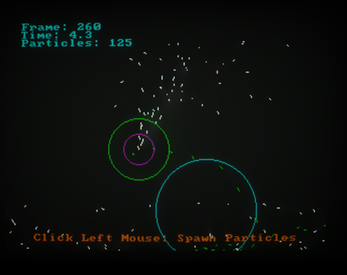Particles using dos-like
Mattias Gustavsson's dos-like framework is really neat to mess around with. It lets you live out your Jonathan Blow drawline() fantasies by letting you draw pixels directly to a buffer and then showing it on screen, or providing you with a framebuffer for you to do whatever you want with. It also has very basic input handling built in, along with (mostly) its own update loop, and some basic drawing functions.
I wrote this in C, which I enjoy revisiting every once in a while. I kinda like C. It's a very honest language.
Setting it up to build is extremely easy because it's all contained within the dos.h and its lib folder. Like it's really cool to me that the built in compiler Just Works™, and adding the code into a Visual Studio project and getting it building was also pretty trivial. I have had a lot of bad experiences with getting these kinds of little personal projects building, so this was a very pleasant surprise.
I wish it was just a bit more documented though, like even just comments on the dos.h functions akin to the raylib cheatsheet would go a long way. A lot of the functions have a ton of side effects, making their use a bit mysterious. Most of what I got working, I did through reading through the included examples plus the source. Fortunately, since it's all written in C, the code is fairly easy to follow and for most things I didn't have to dig too far to find what I needed.
Getting a web build working, is not something I usually do, but the intended compiler (a separate download) makes it very easy to set up. I did make a couple trivial changes to the build html file =in order to make it display nicer here. I gave it a black background and hid some of the text. Ideally I'd want to set up the html such that it's only the canvas, since I think that's most conducive to an itch.io web game, but I am way out of my element here and afraid to touch any of the wasm build stuff.

Comments
Log in with itch.io to leave a comment.
That's cool, and I love these fun little projects
I enjoyed playing around with Macroquad myself - https://macroquad.rs/
Maybe it's not quite as raw but it's certainly fun
I tried Macroquad a while ago a simple excuse to use a bit of Rust for something. It's somewhat similar to raylib, which is a very good thing because I love raylib, though it's been a while since I last used it. Having easy web exports is one of the most notable things about it to me.